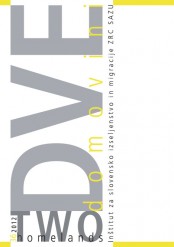Intercultural Relations and Social Participation in the Migration Context
Keywords:
intercultural relations, education, dialogic communicative researchAbstract
The paper presents contemporary European discussion of the definition of the rights of the individual and citizens in the context of migration and of more participatory and inclusive educational system. It is based on the theoretical contributions relevant for the young nation-state of Slovenia, as well as on the results of a research project which collected the personal experiences of its “multicultural” and “multinational” citizens. Their suggestions for a more inclusive educational system are the result of a dialogic research methodology which allows us to hear the vulnerable individuals and groups as social actors. They are collaborators in the research project, which enables the combined influence of theory and practice in the conceptualization of the solutions for the social challenges of contemporary migrant societies.
Downloads
References
Barat, Erszebet (2000). The Discourse of Selfhood: Oral Autobiographies as Narrative Sites for Constructions of Identity. Representing Lives: Women and Auto/biography (ur. Alison Donnell, Pauline Polkey). London: Macmillan Press, 165–173.
Bhabha, Homi (1994). Between Identities, Homi Bhabha interviewed by Paul Thompson. Migration & Identity (eds. Rina Benmayor, Andor Skotnes). Oxford, New York: Oxford University Press, 183–199.
Cook, Kay (2001). Identity. Life Writing: Autobiographical and Biographical Forms (ur. Margareta Jolly). London, Chicago: Fitzroy Dearborn Publishers, 455–458.
Dewey, John (1968). Democracy and Education. New York: The Free Press.
Flecha, Ramon, Gomez, Jesus (2004). Participatory paradigms: Researching 'with' rather than 'on'. Researching widening access: Issues and approaches in an international context (ur. B. Crossan, J. Gallacher, M. Osborne). London: Routledge, 129–141.
Gellner, Ernest (1979). Spectacles & Predicaments. Cambridge: Cambridge University Press.
Gomez, Aitor, Puigvert, Lidia, Flecha, Ramon (2011). Critical Communicative Methodology: Informing Real Social Transformation Through research. Qualitative Inquiry 17/3, 235–245.
Habermas, Jürgen (1991). Državljanstvo i nacionalni identitet: Razmišljanja o evropskoj budučnosti. Evropska istraživanja 1, 140–162.
Kogovšek, Neža idr. (2010). Brazgotine izbrisa: Prispevek h kritičnemu razumevanju izbrisa iz registra stalnega prebivalstva Republike Slovenije. Ljubljana: Mirovni inštitut.
Living together, Combining diversity and freedom in 21st-century Europe: Report of the Group of Eminent Persons of the Council of Europe (GEP Report 2011). Council of Europe.
Milharčič Hladnik, Mirjam (2004). Ohranjanje etnične identitete in tradicije med slovenskimi izseljenci in njihovimi potomci v Združenih državah Amerike. Dve domovini/Two Homelands 19, 121–140.
Milharčič Hladnik, Mirjam (2007). Migracije in medkulturni odnosi. Organizacija znanja 4, 201–205.
Milharčič Hladnik, Mirjam, Mlekuž, Jernej (ur.) (2009). Krila migracij: Po meri življenjskih zgodb. Ljubljana: Založba ZRC.
Milharčič Hladnik, Mirjam (ur.). (2011). In-in: Življenjske zgodbe o sestavljenih identitetah. Ljubljana: Založba ZRC, ZRC SAZU.
Pajnik, Mojca (2010). Socialno državljanstvo, migracije in trg dela. Migranti v Sloveniji med integracijo in alienacijo (ur. Karmen Medica, Goran Lukić, Milan Bufon). Koper: Univerza na Primorskem, Znanstveno-raziskovalno središče, Univerzitetna založba Annales, Zgodovinsko društvo za Južno Primorsko, 13–36.
Pirc, Janez idr. (2010). Afrika v slovenskem šolskem sistemu: Zaključno poročilo projekta izobraževanje za razvoj na trdnih temeljih. Ljubljana: Društvo Afriški center.
Smith, D. Anthony (1991). National Identity. London: Penguin Books.
Strategija ekonomskih migracij 2010–2020 (november 2010) Ljubljana: Vlada Republike Slovenije.
Vižintin, Marijanca Ajša (2009). Sodelovanje slovenskih osnovnih šol z učitelji maternih jezikov otrok priseljencev. Dve domovini/Two Homelands 30, 193–212.
Vrečer, Natalija (2010). Vocational education and training, employment-related mobility and migration. Dve domovini/Two Homelands 32, 121–137.
White Paper on Intercultural Dialogue: “Living Together As Equals in Dignity” (2008). Strasbourg: Council of Europe, http://www.coe.int/t/dg4/intercultural/Source/White%20Paper%20fi nal%20EN%20 020508.pdf (3. 10. 2012).
Zakon o osnovni šoli. Uradni list RS, št. 12/1996.
Zudič Antonič, Nives (2010). Rojstvo in razvoj medkulturne vzgoje. Razprave o medkulturnosti (ur. Mateja Sedmak, Ernest Ženko). Koper: Univerza na Primorskem, Znanstveno-raziskovalno središče, Univerzitetna založba Annales, Zgodovinsko društvo za Južno Primorsko, 201–214.
Downloads
Published
How to Cite
Issue
Section
License

This work is licensed under a Creative Commons Attribution-NonCommercial-NoDerivatives 4.0 International License.
Authors guarantee that the work is their own original creation and does not infringe any statutory or common-law copyright or any proprietary right of any third party. In case of claims by third parties, authors commit their self to defend the interests of the publisher, and shall cover any potential costs.
More in: Submission chapter





